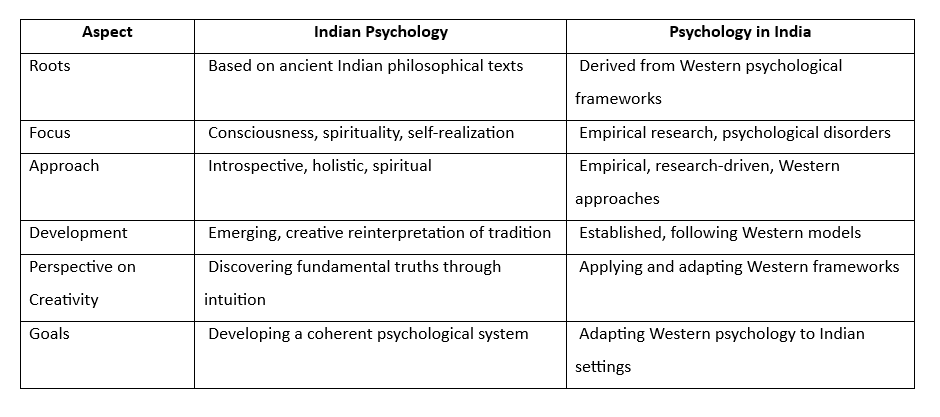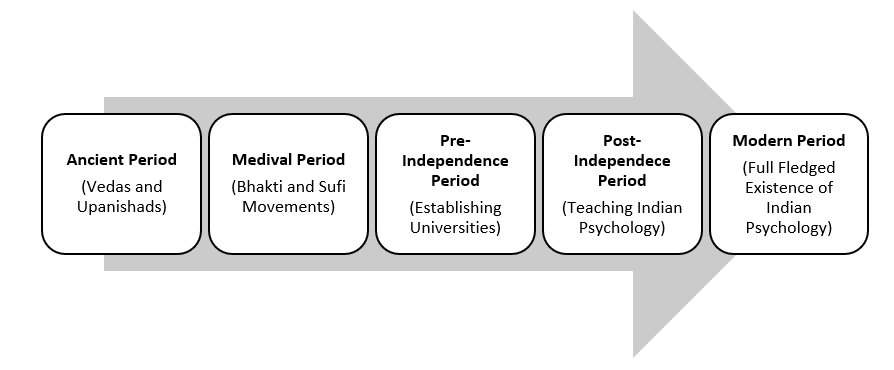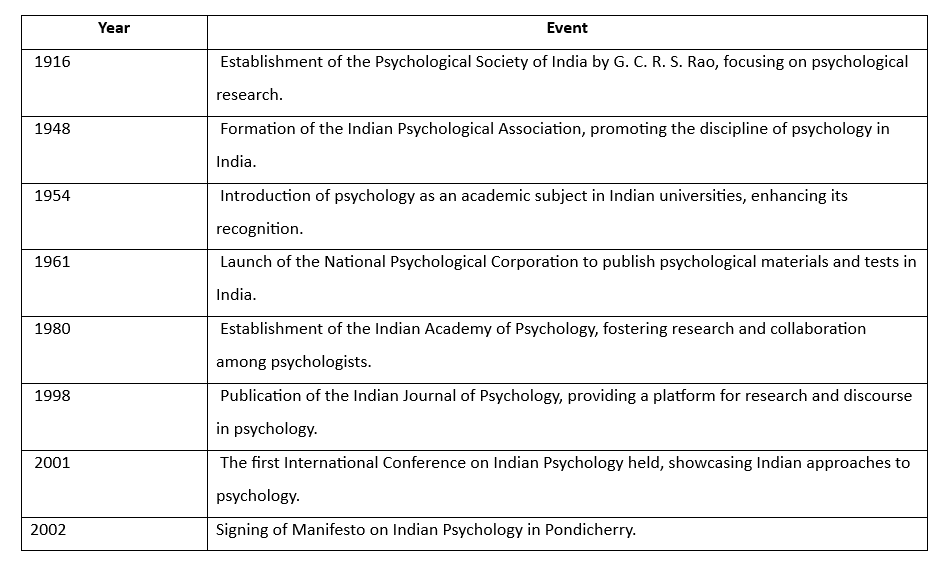Introduction of Indian Psychology
Indian Psychology is not just the psychology of the Indian people. Instead, it refers to psychological ideas and practices developed over thousands of years within the Indian subcontinent. It integrates ancient philosophies, spiritual traditions, and psychological insights from Indian scriptures and practices like yoga and meditation.
Definition of Indian Psychology.
Cornelissen, Misra, & Varma (2014) defined, “Indian psychology as an approach to psychology that is based on ideas and practices that developed over thousands of years within the Indian sub-continent.”
Rao K. R (2014) “Indian psychology refers to a system/school of psychology derived from classical Indian thought and rooted in the psychologically relevant practices such as yoga prevalent in the Indian subcontinent for centuries.”
10 Perspectives to Indian Psychology
- Indian Psychology as rooted in traditional texts– Indian psychology refers to psychological thought rooted in Indian spiritual, philosophical, and cultural traditions, especially derived from classical texts such as the Vedas, Upanishads, and the Bhagavad Gita. It emphasizes understanding the self, consciousness, and the mind from a holistic perspective (Paranjpe, 2006).
- Indian Psychology is consciousness-centered– Indian psychology is defined as a consciousness-centered approach to studying the mind and behavior, where inner experiences and the exploration of self-awareness, spiritual realization, and mental well-being are prioritized (Rao, 1962).
- Indian Psychology as a combination of philosophy and psychology– It is an interdisciplinary field blending the concepts of Indian philosophy with modern psychological practices, emphasizing concepts like dharma (moral duty), karma (action and consequence), and moksha (liberation) as core elements in understanding human behavior and cognition (Cornelissen et al., 2014).
- Indian Psychology can include indigenous psychology– Indian psychology refers to an indigenous system of thought that incorporates traditional Indian philosophical and psychological concepts and methodologies to understand mind and behavior within the Indian cultural context (Misra & Mohanty, 2002).
- Indian Psychology can include spiritual psychology– Indian psychology is seen as a spiritual psychology that focuses on the integration of spiritual practices like meditation, yoga, and mindfulness to enhance mental health, self-regulation, and inner harmony (Safaya, 1975).
- Indian Psychology is holistic psychology– It is described as a holistic approach that integrates body, mind, and spirit, with the goal of realizing the ultimate self (Atman) and achieving a balance between material and spiritual life (Paranjpe & Misra, 2012).
- Indian Psychology focuses on practical and experiential psychology– Indian psychology emphasizes practical wisdom, self-introspection, and experiential learning, drawing heavily from traditional practices like yoga and dhyana (meditation) for personal and societal well-being (Akhilanand, 1948).
- Indian Psychology can be therapeutic psychology– Indian psychology offers therapeutic frameworks for addressing mental health issues, often focusing on emotional regulation, mindfulness, and self-transcendence as methods for healing and growth (Das, 1908).
- Indian Psychology is value-oriented psychology– Indian psychology is deeply value-oriented, focusing on the cultivation of virtues such as compassion, wisdom, and humility. It underscores ethical living and selfless action as essential aspects of psychological well-being (Sinha, 1965).
- Indian Psychology is a psychology of consciousness– Indian psychology is concerned with exploring different levels of consciousness and developing methodologies for self-transformation and higher states of awareness, transcending ordinary psychological frameworks (Hiriyanna, 1932).
Indian Psychology vs Psychology in India
Indian Psychology- Indian psychology refers to a psychological framework based on indigenous Indian philosophical, spiritual, and cultural sources such as the Vedas, Upanishads, and classical Indian thought. The emphasis is on understanding and applying psychological insights from classical Indian thought, developing theories and models like the BMC Trident Model, which are rooted in ancient traditions but applied to modern psychological discourse.
Psychology in India- Psychology in India refers to the practice of psychology in India. As it has been conducted in India over the past century, predominantly following the Western, mainstream psychological models. The focus is on psychological research, assessment, therapy, and intervention, utilizing Western-derived tools like standardized tests and therapeutic models.

Indian Psychology vs Psychology in Indian Psychology
Nature of Indian Psychology
According to Safaya (1975), the nature of Indian psychology can be understood using these assumptions-
- Atman as the Essence of Human Personality– The core of human personality is the Atman or Self, which transcends the body and mind. The Atman governs both physical and mental faculties, making it distinct from them.
- Atman is Pure Consciousness– The Atman is of the nature of Pure Consciousness. It illuminates both the mind and body, giving life to them and enabling their functioning. Consciousness is the essence of existence.
- Atman’s Connected with Cosmic Consciousness– The Atman (individual consciousness) is inherently connected to the essence of the universe, known as cosmic consciousness. There is a direct relationship between individual consciousness and the greater universal consciousness.
- The Universe is an Expression of Pure Consciousness (Brahman)– The universe, including all its components, originates from Pure Consciousness (Brahman). According to Visistadvaita philosophy, the universe is the body of Brahman, just as the human body and mind are governed by the soul.
- Cosmic Correspondence Exists– There is a cosmic parallel to individual existence, including a cosmic body (physical universe, or Virat), cosmic mind (Hiranyagarbha), and cosmic consciousness. The human body, mind, and self reflect this larger cosmic structure, demonstrating the interconnectedness of individual and universal principles.
- Direct Relationship Between Individual and Cosmic Entities– There is a direct correlation between the individual body and the cosmic body, the individual mind and the cosmic mind, and the individual self and the cosmic self. This reflects the interconnectedness of the microcosm (individual) and the macrocosm (universe).
- Consciousness is Present Throughout the Universe– Consciousness is omnipresent throughout the universe, animating both organic and inorganic matter. The variation in life forms, from lower organisms to higher ones, is due to differences in the quantum of consciousness and its threefold nature (sattva, rajas, tamas), as explained by Sankhya philosophy. Even in the most inert forms of matter, like atoms, consciousness exists, though characterized by tamas (inertia). Consciousness is regarded as the underlying force governing all existence.
- Three Sources of Knowledge– Indian psychology recognizes three valid sources of knowledge: direct cognition (pratyakṣa), inference (parokṣa), and intuition (aparokṣa), with intuition explored in detail by Yoga. It asserts that the individual mind can transcend ordinary cognition to access higher states of super-cognition. This connection between minds, explained by Swami Vivekananda, enables phenomena like intuition and telepathy without mystery.

Nature of Indian Psychology
History of Indian Psychology

History of Indian Psychology
- Ancient Period
The origins of Indian psychology can be traced back to ancient Vedic literature, including the Vedas and Upanishads. The focus of Indian psychology was on self-awareness, consciousness, and mental processes, with a particular emphasis on attaining a balanced life. The four life goals (Purusarthas)—Dharma, Artha, Kama, and Moksha—offered psychological insights about the purpose of life and mental well-being.
Indian thinkers like Patanjali in his Yoga Sutras discussed the mind’s control and discipline through Dhyana Yoga (meditation), and the Bhagavad Gita elaborated on emotional management through Karma Yoga (path of action), Bhakti Yoga (path of devotion), and Jnana Yoga (path of knowledge). Schools like Sankhya, Nyaya, Vedanta, and Buddhist philosophies delved into theories of cognition, consciousness, and the self. Jain and Charvaka schools also contributed unique perspectives on mind and behavior, while Ayurveda offered a holistic understanding of mental health and well-being (Paranjpe, 2006; Paranjpe & Misra, 2012).
- Medieval Period
During the medieval period, psychology continued to evolve through religious and philosophical discourses. Medieval India was deeply influenced by Bhakti (devotional) and Sufi traditions, where the mind’s connection to divine love and emotional well-being was emphasized. Saints and poets like Kabir and Mirabai explored human emotions, focusing on the soul’s union with the divine, which led to discussions of emotional states and their psychological consequences.
In Buddhist and Jain traditions, scholars continued to expand on earlier theories of cognition and mental processes. Buddhist psychology during this period introduced a more structured understanding of human suffering and its psychological roots, particularly through the Four Noble Truths and the Eightfold Path, which highlight emotional regulation and cognitive awareness as pathways to enlightenment (David, 1936; Rao, 1962).
- Pre-Independence Period
With the British colonization in the 19th century, Indian knowledge systems were overshadowed by Western psychology, which was rooted in positivism and empiricism. British rule saw the establishment of universities in 1857 (Calcutta, Madras, Bombay), where psychology was initially introduced as a part of teacher training programs rather than a standalone discipline. The neglect of Indian psychology during this period was due to the British focus on promoting Western scientific models, with Indian ideas being regarded as metaphysical or non-scientific (Sinha, 1986).
However, some Indian scholars resisted this imposition by attempting to revive Indian psychological thought. Prominent thinkers like Ananda Coomaraswamy and Surendranath Dasgupta emphasized the need to incorporate indigenous knowledge into psychological studies. Unfortunately, mainstream academia continued to align with the Euro-American model of psychology (Dalal, 2011).
- Post-Independence Period
After gaining independence in 1947, India saw a slow but steady expansion in psychology departments at various universities, such as Calcutta University, Lucknow University, and Allahabad University. Many early Indian psychologists, having been trained in Britain or the United States, brought back Western methods and theories of psychology, which led to a continuation of the Western model in Indian academia (Misra & Dalal, 2015).
During this period, Indian psychology began to gain recognition as scholars began researching indigenous topics, particularly in areas of cross-cultural psychology and social psychology. Key institutions such as Banaras Hindu University and Delhi University became significant centers for psychological research (Mohanty & Mohanty, 2017).
Notably, Girindrasekhar Bose established the Indian Psychoanalytical Society in 1922, blending Freudian psychoanalysis with Indian concepts, marking an early attempt at indigenization (Akbar Husain, 2015). Durganand Sinha further contributed by advocating for a culturally rooted psychology and pushed for indigenization, as evident from his writings on the history of psychology in India (Sinha, 1998).
- Modern Period
In modern India, psychology has diversified into many fields, including clinical psychology, industrial psychology, educational psychology, and social psychology. Contemporary Indian psychologists have attempted to reclaim indigenous knowledge systems and incorporate them into modern psychological frameworks (Dalal, 2014).
In 2002 more than 150 psychologists gathered in Pondicherry, India, led by K. Ramakrishna Rao, Girishwar Misra and signed the Manifesto on Indian Psychology
Efforts have been made to bring attention to yoga and mindfulness as psychological tools for well-being. The Indian Council of Social Science Research (ICSSR) and the University Grants Commission (UGC) have provided funding for research that explores Indian contributions to psychology. Many contemporary scholars, like Bhushan (2017) and Misra (2011), continue to advocate for the inclusion of Indian epistemologies in global psychology. Cornelissen and Joshi’s (2004) work on Yoga and consciousness has further bolstered the integration of ancient Indian psychological practices with modern scientific approaches.

Landmark Events in Indian Psychology
Psychology in India today stands at a unique crossroads, balancing Western methodologies while gradually embracing indigenous philosophies, particularly in therapeutic and clinical contexts. Cognitive science, neuroscience, and positive psychology are emerging fields where Indian psychology is being integrated with global perspectives (Misra, 2011).
Scope of Indian Psychology
Indian psychology has a wide scope, addressing various aspects of human existence and well-being-
- Values– Indian psychology explores values like compassion, empathy, selflessness, and humility, which are essential for personal and social harmony.
- Personality– Concepts like Gunas and Doshas help in understanding personality types and traits.
- Perception– Indian thought delves into the nature of perception and how it influences our view of reality.
- Cognition– Indian psychology emphasizes the role of mental discipline (through practices like meditation) in improving cognitive functions.
- Emotion– Emotions are viewed as forces that need to be understood and regulated for inner peace.
- Creativity– Indian psychology considers creativity a spiritual process, a flow that connects the individual to a higher source of inspiration.
- Education– Indian psychology promotes holistic education that nurtures both intellect and character, encouraging self-inquiry and self-realization.
- Spirituality- Indian psychology places great importance on spiritual development as a key to mental well-being.
References
Choudhury, A. (2008). Psychology in India: Current trends and perspectives. Sage Publications.
Dholakia, R. (2002). Indian psychology: The current scenario. Indian Journal of Psychology.
Dube, R. C., & Bhatia, P. S. (1989). Psychology in India: A historical overview. Indian Journal of Psychology.
Misra, G. (2009). The evolution of psychology in India. Journal of Indian Psychology.
Safaya, R. (1998). Psychology in the Indian context: Theories and practices. Indian Psychological Association.
Sharma, R. (1999). History of psychology in India. Indian Journal of Psychology.
Sinha, D. (1999). Research in Indian psychology: A review. Indian Journal of Psychology.
Verma, K. K., & Verma, R. M. (2003). Psychology: A historical perspective. Indian Psychological Association.
Subscribe to Careershodh
Get the latest updates and insights.
Join 17,088 other subscribers!
Niwlikar, B. A. (2021, October 26). Indian Psychology- Discover 2 Definitions, 6 Historical Epoches, 8 Scopes. Careershodh. https://www.careershodh.com/indian-psychology/
